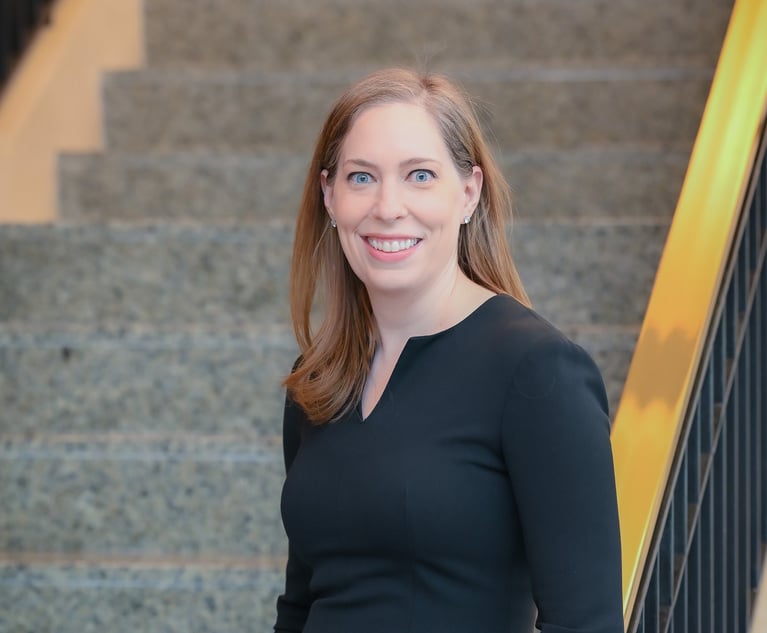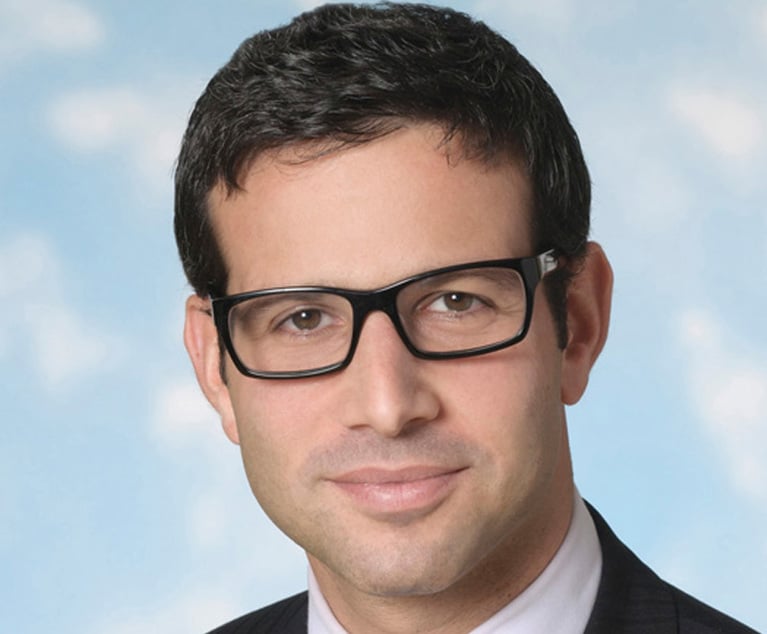 Joseph Greenaway, Jr., partner with Arnold & Porter. Courtesy photo
Joseph Greenaway, Jr., partner with Arnold & Porter. Courtesy photoJudge Joseph Greenaway Jr.'s 'Continuous Improvement' and 'Joyful' Work Ethic
Greenaway, a partner with Arnold & Porter since retiring from the federal bench after 27 years, is a 2024 American Lawyer Lifetime Achievement honoree.
November 10, 2024 at 09:47 AM
5 minute read
Not all paths in the legal profession are linear. Just ask Judge Joseph Greenaway Jr.
Greenaway, a partner with Arnold & Porter Kaye Scholer since retiring from the U.S. Court of Appeals for the Third Circuit, did not always aspire to be a judge, saying it was partly "serendipitous."
However he went on to spend 27 years of his career on the federal bench before joining Arnold & Porter last year.
"Everyone's path is different, and mine, because it wasn't an ambition, was one that I think was somewhat serendipitous," said Greenaway. "I worked initially at a law firm. I clerked. I was an assistant U.S. attorney (in the District of New Jersey), and I was in-house counsel at Johnson & Johnson, and in each of those jobs, my sort of personal mantra was continuous improvement, and work harder than anybody. It's always hard to work harder than anyone else when you're in the U.S. Attorney's Office, because everybody worked hard. But I certainly gave it my all."
That drive ultimately landed him as a judge on the U.S. District Court for the District of New Jersey in 1996, after he was nominated by President Bill Clinton. Greenaway had served there for more than 13 years when President Barack Obama elevated him to the U.S. Court of Appeals for the Third Circuit in 2010.
On the appeals court, Greenaway helped decide a number of important cases, including a 2023 decision in Range v. Attorney General concerning a convicted felon's second amendment rights, and a 2013 ruling that dismissed a former Rutgers football player's lawsuit against video game manufacturer Electronic Arts for using his likeness and biographical information.
As a former federal prosecutor and in-house counsel, Greenaway developed a reputation for his broad range of legal experience.
"I think that one of the things that I've loved about my career is doing things (where people ask), 'Oh, why are you doing that?' When I became in-house in 1990, not many people were going in-house at the time. And most companies had very small in-house departments. J&J was the exception, given its size," said Greenaway. "And I think being in-house was wonderful for my time on the bench. It let me know how corporations were run, who were the important decision makers, and such."
Paul Fishman, head of Arnold & Porter's crisis management and strategic response team, who has known Greenaway since Harvard Law School, described Greenaway's work ethic as "joyful."
"He has an amazing work ethic and he actually loves practicing law," said Fishman, former U.S. attorney for New Jersey. "That’s partly because he’s fascinated by the legal principles that apply to almost every issue that crosses his desk, and the story of every client he represents.”
Even with his background and work ethic, little can prepare one for the day-to-day rigors of being a federal judge, Greenaway said.
"The biggest challenge that you have is just getting a hold on—what are the issues that you have to resolve?" he said, adding, "It's not just knowing the law. You now have to create a public persona."
"You come in contact with jurors. You come in contact with administrative staff. You have your own staff. Contact with lawyers of every skill set, of every disposition, and you have to sort of create this judicial persona that makes everyone feel comfortable in your courtroom, makes everyone know that you are in charge of your courtroom, and makes everyone know that you haven't just read everything, but you're on top of everything, and you are prepared to make a decision, whether it be difficult or not," Greenaway added.
A federal judge is bound to encounter many difficult cases in their tenure. For Greenaway, a challenging case that comes to mind is one he presided over early in his tenure, revolving around leather tanning, a chemical process that transforms animal hides into leather,
"It was just an interesting, reflective moment that you're in this job, and it's challenging in a way that you haven't been challenged before, and it's also a different dynamic," said Greenaway. "When you're a lawyer, you always have a client, and your arguments are contoured by the facts you develop on behalf of your client. In the role of a judge, you're just trying to come to the right decision, and that's difficult, particularly when you have good lawyers who provide excellent arguments."
"And you sit there and you're like, 'What is my process?' How do I go about thinking about this and making a solid decision? And that's kind of what the growth of a judge is...how do you create a way to think about difficult problems and then resolving them," Greenaway added.
During his nearly three decades as a federal judge, Greenaway has seen the bench become more diverse, with more women and people of color, as well as with younger judges becoming more common than when he first became a district court judge at the age of 38.
"Joe has always been passionate about promoting and mentoring younger lawyers, particularly young lawyers of color," Fishman said. "He is very eager to use his platform, his access, to make a difference—not just for his clients, but for others in the profession."
Just like his time as judge, his transition to private practice has not been a linear journey, as Greenaway has carved out his own practice at Arnold & Porter, handling litigation, appellate and other matters, as well as doing expert witness and pro-bono work.
"He doesn’t want to be confined to the traditional role that people envision or seek when they leave the bench to come to a law firm. He really wants to mix it up. And he's already been quite successful," said Fishman.
NOT FOR REPRINT
© 2025 ALM Global, LLC, All Rights Reserved. Request academic re-use from www.copyright.com. All other uses, submit a request to [email protected]. For more information visit Asset & Logo Licensing.
You Might Like
View All
'I Want to Leave a Mark': What We Learned From This Year's Industry Awards Winners

Elizabeth Cooper of Simpson Thacher on Building Teams in a 'Relationship Business'
4 minute read
Kirkland's Daniel Lavon-Krein: Staying Ahead of Private Equity Consolidation

Vinson & Elkins: Traditional Energy Practice Meets Energy Transition
4 minute readTrending Stories
- 1States Accuse Trump of Thwarting Court's Funding Restoration Order
- 2Microsoft Becomes Latest Tech Company to Face Claims of Stealing Marketing Commissions From Influencers
- 3Coral Gables Attorney Busted for Stalking Lawyer
- 4Trump's DOJ Delays Releasing Jan. 6 FBI Agents List Under Consent Order
- 5Securities Report Says That 2024 Settlements Passed a Total of $5.2B
Who Got The Work
J. Brugh Lower of Gibbons has entered an appearance for industrial equipment supplier Devco Corporation in a pending trademark infringement lawsuit. The suit, accusing the defendant of selling knock-off Graco products, was filed Dec. 18 in New Jersey District Court by Rivkin Radler on behalf of Graco Inc. and Graco Minnesota. The case, assigned to U.S. District Judge Zahid N. Quraishi, is 3:24-cv-11294, Graco Inc. et al v. Devco Corporation.
Who Got The Work
Rebecca Maller-Stein and Kent A. Yalowitz of Arnold & Porter Kaye Scholer have entered their appearances for Hanaco Venture Capital and its executives, Lior Prosor and David Frankel, in a pending securities lawsuit. The action, filed on Dec. 24 in New York Southern District Court by Zell, Aron & Co. on behalf of Goldeneye Advisors, accuses the defendants of negligently and fraudulently managing the plaintiff's $1 million investment. The case, assigned to U.S. District Judge Vernon S. Broderick, is 1:24-cv-09918, Goldeneye Advisors, LLC v. Hanaco Venture Capital, Ltd. et al.
Who Got The Work
Attorneys from A&O Shearman has stepped in as defense counsel for Toronto-Dominion Bank and other defendants in a pending securities class action. The suit, filed Dec. 11 in New York Southern District Court by Bleichmar Fonti & Auld, accuses the defendants of concealing the bank's 'pervasive' deficiencies in regards to its compliance with the Bank Secrecy Act and the quality of its anti-money laundering controls. The case, assigned to U.S. District Judge Arun Subramanian, is 1:24-cv-09445, Gonzalez v. The Toronto-Dominion Bank et al.
Who Got The Work
Crown Castle International, a Pennsylvania company providing shared communications infrastructure, has turned to Luke D. Wolf of Gordon Rees Scully Mansukhani to fend off a pending breach-of-contract lawsuit. The court action, filed Nov. 25 in Michigan Eastern District Court by Hooper Hathaway PC on behalf of The Town Residences LLC, accuses Crown Castle of failing to transfer approximately $30,000 in utility payments from T-Mobile in breach of a roof-top lease and assignment agreement. The case, assigned to U.S. District Judge Susan K. Declercq, is 2:24-cv-13131, The Town Residences LLC v. T-Mobile US, Inc. et al.
Who Got The Work
Wilfred P. Coronato and Daniel M. Schwartz of McCarter & English have stepped in as defense counsel to Electrolux Home Products Inc. in a pending product liability lawsuit. The court action, filed Nov. 26 in New York Eastern District Court by Poulos Lopiccolo PC and Nagel Rice LLP on behalf of David Stern, alleges that the defendant's refrigerators’ drawers and shelving repeatedly break and fall apart within months after purchase. The case, assigned to U.S. District Judge Joan M. Azrack, is 2:24-cv-08204, Stern v. Electrolux Home Products, Inc.
Featured Firms
Law Offices of Gary Martin Hays & Associates, P.C.
(470) 294-1674
Law Offices of Mark E. Salomone
(857) 444-6468
Smith & Hassler
(713) 739-1250










